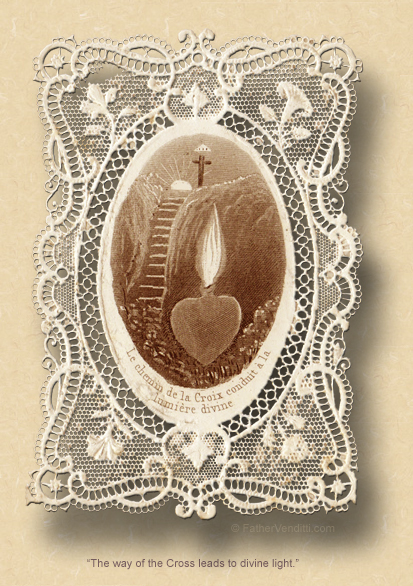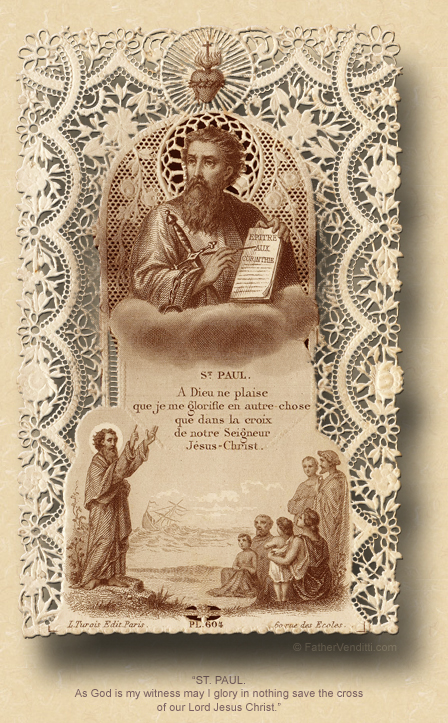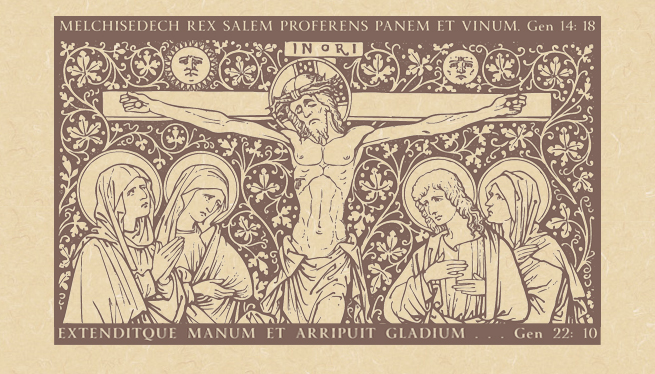Filling the Space on the Shelf.
The Fourteenth Sunday of Ordinary Time.
Lessons from the tertiary dominica, according to the ordinary form of the Roman Rite:
• Isaiah 66: 10-14.
• Psalm 66: 1-7, 16, 20.
• Galatians 6: 14-18.
• Luke 10: 1-12, 17-20 (or 10: 1-9).
The Seventh Sunday after Pentecost.
Lessons from the dominica, according to the extraordinary form of the Roman Rite:
• Romans 6: 19-23.
• Psalm 33: 12, 6.
• Matthew 7: 15-21.
The Seventh Sunday after Pentecost; and, the Feast of the Holy Martyr Hyacinth.
Lessons from the pentecostarion, according to the Ruthenian recension of the Byzantine Rite:
• Romans 15: 1-7.
• Matthew 9: 27-35.
FatherVenditti.com
|
 8:51 AM 7/3/2016 — Iubiláte Deo, omnis terra. The response for today's psalm: “Let all the earth cry out to God with joy.” Why? The lessons for today's Mass are full of it. The prophet Isaiah predicts what will come to pass when the Babylonian exile is over and Jerusalem is restored. In the lesson from Luke's Gospel, our Lord sends seventy-two disciples out to announce the kingdom of God, and they return full of joy, themselves amazed at what they were able to accomplish. These two lessons are actually bookends, closing in on the subject of joy and the virtue of Hope from opposite ends: one, speaking to a people in abject suffering, predicting a joy which is yet to come; the other, a realized joy which is inherently naïve. This mission of the seventy-two is early in our Lord's public life—he hasn't even yet chosen his twelve apostles—and the joy they experience upon returning from this first mission is predicated upon them having no inclination of why our Lord is even here, namely, His Passion and death, of which these people know nothing. In other words, in the first lesson a movement from suffering to joy, and in the second a movement from joy to suffering. 8:51 AM 7/3/2016 — Iubiláte Deo, omnis terra. The response for today's psalm: “Let all the earth cry out to God with joy.” Why? The lessons for today's Mass are full of it. The prophet Isaiah predicts what will come to pass when the Babylonian exile is over and Jerusalem is restored. In the lesson from Luke's Gospel, our Lord sends seventy-two disciples out to announce the kingdom of God, and they return full of joy, themselves amazed at what they were able to accomplish. These two lessons are actually bookends, closing in on the subject of joy and the virtue of Hope from opposite ends: one, speaking to a people in abject suffering, predicting a joy which is yet to come; the other, a realized joy which is inherently naïve. This mission of the seventy-two is early in our Lord's public life—he hasn't even yet chosen his twelve apostles—and the joy they experience upon returning from this first mission is predicated upon them having no inclination of why our Lord is even here, namely, His Passion and death, of which these people know nothing. In other words, in the first lesson a movement from suffering to joy, and in the second a movement from joy to suffering.
We'll start with the first because it is first. Everyone agrees that this second half of Isaiah wasn't written by Isaiah at all; nobody knows who actually wrote it, but it doesn't matter. What we do know is when it was written, and rather precisely: at a time when history, for the Jewish people, had swung full circle to where it began. Israel, in the words of this unknown prophet, was back again in a metaphorical “Egypt,” enslaved in sin and surrounded with the black chaos of despair. All that Moses had created, all that Joshua and David had achieved, was gone. Jerusalem had been conquered by the Babylonians, the Temple of Solomon had been destroyed, the very walls of the city itself were in ruins. The once lush farms which surrounded the city were burned and now overgrown with weeds, the Davidic dynasty had been deposed, the priesthood discredited; and, in the month of August, in the year 587 BC, the third and final massive deportation of the people from their homeland had begun. Those of you from the Philippines or who are old enough to remember the Second World War may remember the Bataan Death March; this was twenty times worse. Read Jeremiah, chapters thirty-nine and forty: what was left of the Isarelites were herded together at Ramah, a little village north of Jerusalem, where they were sorted out: some to be executed on the spot, some to be left behind to starve to death in the scorched deserts of Palestine, but most of them to be chained together and force-marched to Babylon. Those who would survive the trip would have nothing to look forward to but slavery. And just this way a golden, glorious age crashed and burned.
This is the Israel to which this Deutero-Isaiah, as he is called, writes. And what does he write?
[Thus says the Lord] Rejoice with Jerusalem, and be glad for her, all you who love her; rejoice with her in joy, all you who mourn over her; that you may suck and be satisfied with her consoling breasts; that you may drink deeply with delight from the abundance of her glory (Isaiah 66: 10-11 RSV).
Knowing the history of when this is written, we want to ask, “On what planet is this man living?” But, remember, he's a prophet; he's not writing of what is, but what is to come. With the voice of God he speaks of hope and joy to a people who have neither.
That's one bookend. The other is the passage from Luke, which I described as inherently naïve. Jesus has just begun to preach publicly and has generated a lot of initial interest. He's been able to attract a rather large and diverse assortment of disciples, but has not yet chosen from among them the twelve who would become His apostles and the first bishops of His Church. As the passage opens, He's sending them out in pairs to preach ahead of Him before he arrives Himself as the main event, and here He gives them some rudimentary instructions: don't worry about money or luggage or sandals, don't talk to anyone on the road, don't stay where you're not welcome, eat whatever is put before you, don't move from house to house but choose one base of operations in any town, cure the sick if you can, and announce the kingdom of God. Very simple instructions to obey, which they do, returning from this mission full of joy and optimism because of the great success they've had. It's naïve because, most likely, this was what they thought Jesus was all about: a motivational speaker who had effectively trained them to make people feel good about themselves. Their joy was real, to be sure, but it was naïve because it's all simply a prolog: they had no hint of Who Jesus really is or His reason for being there. When He started to give them hints in chapter six of John's Gospel, talking about what they would have to sacrifice for following Him, and predicting His own death,—as Saint John puts it—“After this, many of his disciples went back to their old ways, and walked no more in his company” (John 6: 67 Knox). There is no doubt that some of the disciples the Evangelist speaks of here were some of the original seventy-two.
There are the two bookends: one, a story of joy in anticipation, spoken to a people with no hope; the other, a story of a superficial joy that is totally ignorant of how superficial it really is, spoken to a group of men who have no idea of what sufferings lie ahead of them.
And sandwiched in between them, a brief little lesson from the “clarifier” of all things: the Blessed Apostle Paul, the one man among all of our Lord's disciples who, himself, had come full circle,  once hating and persecuting the Church, then becoming her most effective missionary; once hated and despised by the other apostles, even after Peter himself had declared him one of them, then establishing Churches in parts of the world that the other apostles had never even heard of, with some of them following after him to continue to shepherd those very same Churches. And what does he say to draw these two opposite bookends together and fill the space on the shelf? “But may I never boast except in the cross of our Lord Jesus Christ, through which the world has been crucified to me, and I to the world” (Gal. 6: 14 NABRE). once hating and persecuting the Church, then becoming her most effective missionary; once hated and despised by the other apostles, even after Peter himself had declared him one of them, then establishing Churches in parts of the world that the other apostles had never even heard of, with some of them following after him to continue to shepherd those very same Churches. And what does he say to draw these two opposite bookends together and fill the space on the shelf? “But may I never boast except in the cross of our Lord Jesus Christ, through which the world has been crucified to me, and I to the world” (Gal. 6: 14 NABRE).
The moral, if you want to call it that, is simple enough, even though it's presented in the lessons of today's Mass in reverse order: there is no escape from suffering for the follower of Christ; but, there is no suffering that the follower of Christ accepts that does not result in a joy that supersedes anything this world has to offer. Almost obvious beyond being worth discussion. But, as easy as it is to comprehend and say, it's not so easy to remember when things look bleak. But that's a failure in ourselves, not in God as some people make the mistake of thinking: it's a failure to ask for—and actively cultivate—the virtue of Hope.
Most of you, I know, don't go to Mass every day, but if you do you might remember, a couple of weeks ago, hearing a lot of ponderous sounding history lessons read to you from the Second Book of Kings. In one of them, the King of Judea, whose country is in a shambles, discovers the Book of Moses in the ruins of the Temple. He reads it out loud to the people, and immediately everyone knows what's been going wrong all this time: their ancestors had made this covenant with God, but over the years it had been forgotten, and this was why things weren't going well. The prophet Amos had predicted it, saying,
See, days are coming—oracle of the Lord God—when I will send a famine upon the land: Not a hunger for bread, or a thirst for water, but for hearing the word of the Lord (Amos 8: 11 NABRE).
Tomorrow we'll be celebrating the 229th anniversary of own country's independence, and I don't have to tell you that watching the news these days can be a depressing prospect for anyone who loves this country, and particularly for those of us who both love our country and practice our Catholic Faith. We're not as bad off, certainly, as the Israelites in the days of the Babylonian exile, but we might feel that way. And, as the Prophet Amos says, it's not because of famine or drought—not because of any natural disaster—that we weep for our nation; that we could understand and handle. It's because our country has turned away from the Word of God. But if the words of the prophets teach us anything, they teach us that we're not the first, nor will we be the last, people to suffer through such times. It is the God-given lot of every believer to live in the midst of those who do not believe.
Many years ago, when I was in the seminary, we had a visit from Mother Teresa, and she said something in her talk to us which I will never forget. She said, “What is the point of being saved if there's nothing to be saved from?” The blind people to whom our Lord gave sight would never have received that gift had they not been blind in the first place; all the people our Lord cured in the Gospel passages we've been reading through at daily Mass from chapter eight of Matthew would never have been cured by our Lord had they not been afflicted in the first place. And it's because our country is in such desperate need of an infusion of Grace that it will receive it; maybe not when we would like, maybe not even in our life-time, but it will happen. It will happen because we, just like our Lord's first seventy-two disciples, will obey his command to proclaim the kingdom of God to everyone we meet, with the added advantage of not being naïve to what that actually means: that suffering is the gateway to joy, and that the Way of the Cross is the road to heaven.
And what will happen to our country will also happen to ourselves as we endure our own personal trials and crosses. The only thing we need to worry about is the temptation to become discouraged and give up, and not understand the role of the Cross in our own lives. As the prophet said in the last line of today's first lesson: “When you see this, your heart shall rejoice and your bodies flourish like the grass; the Lord's power shall be known to his servants” (Isaiah 66: 14 RM3).

|

